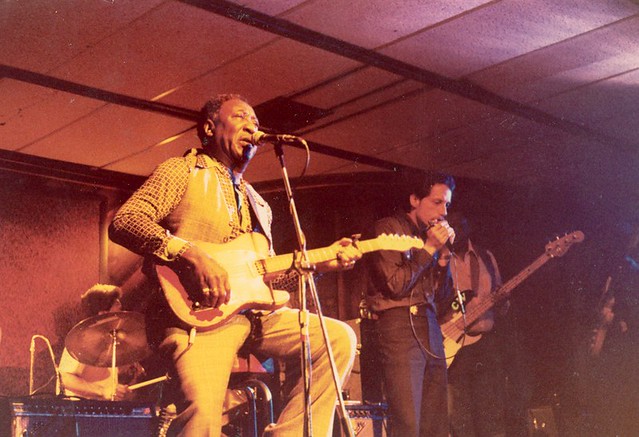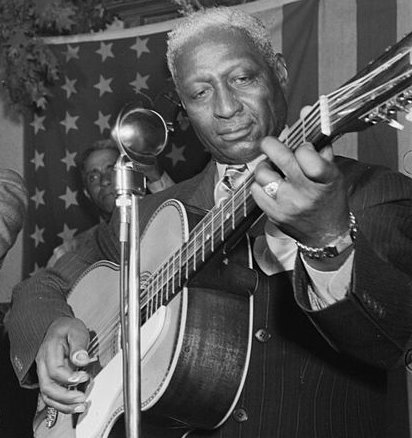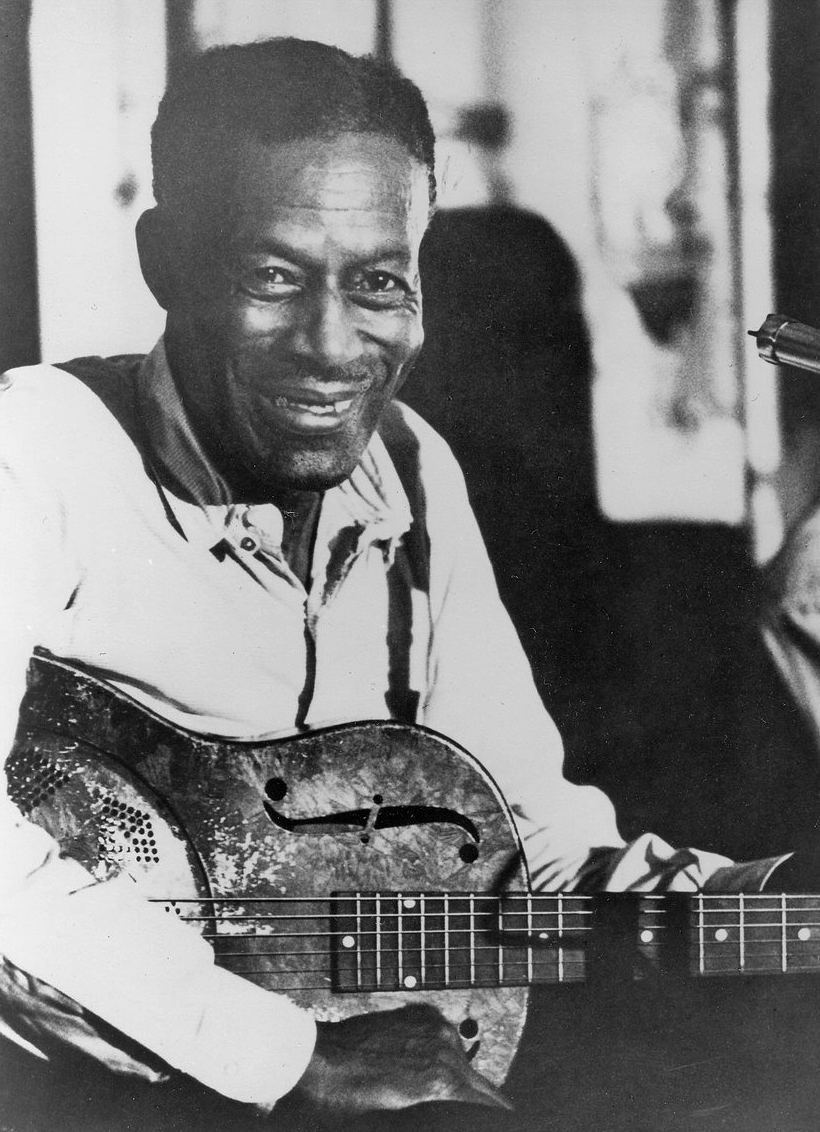Early blues musicians were prototype rock and rollers. They traveled from town to town, playing their music and evading the law. The blues was a musical style created in the late 19th century in the Mississippi Delta. Many bluesmen were born into poverty on plantations and lived rough lives full of hard labor, whiskey, and women, all of which added to the authenticity of their music. This list is concerned with the lives of those true-blue blues artists.
10. Skip James
Skip James was born in Bentonia, Mississippi to a father who was a bootlegger turned preacher. James’ father left the family in 1907, one step ahead of the law. His mother scrounged together some money and bought him his first guitar when he was ten years old. James ran away from home for a year and later dropped out of high school to build levees and cut timber. He moved to Memphis and worked as a pianist in a brothel. At one time he even worked as a pimp.
9. Blind Lemon Jefferson

Jefferson born on October 26, 1894, or at least that’s what he wrote on his World War I draft registration. Like many blues artists, he was born into a family of sharecroppers. In the 1920 census, he listed his occupation as “musician” and his employer as the “general public.” Jefferson spent most of his life traveling and playing music for anyone who would listen. For someone who was blind, music was one of the few professions available to him. He was buried in an unmarked grave until 1967, when a Texas Historical Marker was given to him.
8. Bessie Smith

Smith was born in 1894, as one of ten children. Both her parents were dead by her eighth birthday. Her 1923 “Down Hearted Blues” recording session sold more than 780,000 records in six months. Unfortunately, by the 1930s, her Classic Blues style went out of popularity. The Depression and excessive alcohol affected her career as well. After a performance in 1937, Smith and her manager were driving down Highway 61 when their car struck an oncoming truck. Smith was severely injured in the accident and taken to the hospital, where she bled to death.
7. Muddy Waters

Originally named McKinley Morganfield, Waters came to be in 1915 in Rolling Fork, Mississippi. His mother died when he was three, and he was raised by his grandmother. His name came from his love of playing in the water of nearby Deer Creek. By thirteen, he was playing harmonica at local gatherings. At 17, he had saved enough money from sharecropping to buy a guitar, and he taught himself how to play. He traveled around Clarksdale playing parties, juke joints, dinner parties, and anywhere else with somebody around who would pay him. He later moved to Chicago, and hit it big on radio.
6. B.B. King

B.B. remains one of history’s most well-known blues artists. He’s managed to live into old age, avoiding the early deaths that claimed so many musicians and blues artists. King was born on a plantation in Itta Bena, Mississippi in 1925. In 1947 he hitched a ride to Memphis, Tennessee, chasing his music dreams. After a show in Arkansas, two men got into a fight and knocked over a gas stove, and the dance hall was soon engulfed in flames. B.B. ran outside with the rest of the people inside. He realized he forgot his guitar, so he ran inside after it. He later learned the two men who started the fire were fighting over a woman named Lucille. So King named his guitar Lucille, to remind him never to fight over a woman.
5. Blind Willie Johnson

Willie Johnson was not born blind, and it is not known how he became blind. But legend holds that his stepmother threw lye in his face when he was 7, in retaliation for fighting his father. Johnson’s daughter Sam Faye Kelly said she could remember him singing in the kitchen and reciting passages from the Bible. She was still very young when he “went away.” Johnson’s song “Dark Was the Night (Cold Was the Ground)” was put on the spaceship Voyager 1 in 1977, so aliens can listen to his music too.
4. Ledbelly

Huddie Ledbetter, better known as Ledbelly, was born in 1889 in Mooringsport, Louisiana. After 8th grade, Ledbelly quit school and became a popular local musician in “sukey jumps” and “juke joints.” When he couldn’t find work as a musician, he picked cotton. He pissed off a lot of men with the seductive power of his music. He got into a fight with a man in Dallas in 1918, and ultimately killed him. He was sentenced to thirty years in the state prison in Huntsville, Texas. He wrote the governor a song, asking him for a pardon. The governor granted this pardon, despite making a campaign promise to never pardon a prisoner. In 1930, he got into a fight again. He was sentenced to work at the Angola Farm prison in Louisiana. He was diagnosed with Lou Gehrig’s disease in 1949, and died later that year.
3. Charley Patton

In April 1891, Charley Patton entered the world as the son of sharecroppers in southern Mississippi. His guttural and whiskey-soaked voice was as thick as the Delta silt. At a time when most blues songs dealt with themes of unrequited love, Patton delved into topics of natural disaster (High Water Blues), and prison (High Sheriff Blues). He loved to drink and smoke, and was jailed at least once. He had some opinions on women too. In “Pony Blues,” he says a brown skin woman is “like somethin’ fit to eat” while a jet-black woman “better not put her hands on me.” Later on in the song, Patton announced he “don’t wanna marry, just wanna be your man.”
2. Robert Johnson

Johnson was born on the Mississippi Delta on May 8, 1911. He grew up on a plantation. The story most commonly associated with Johnson is that he sold his soul to the Devil at a crossroads, in exchange for incredible musical ability. Mere months after mastering his instrument, the Devil came to claim what was now his, and Johnson died at the young age of 27. The circumstances surrounding his death are unknown. Some allege poisoning by a jealous lover, but his death certificate claims syphilis. Johnson recorded only 29 songs in his lifetime, but his impact on blues music and rock music is indelible.
1. Son House

House was born in 1902, near Lyon, Mississippi. He worked in the cotton fields as a teenager, and became involved with the Baptist church. He had a fallout with the church however, when he had an affair with a woman ten years older than him. House got in a fight at a house party in Lyon in 1928, and shot and killed a man. House was sent to work on Parchman Farm. His sermon-like music was infused with the passion for oration that he had developed as a preacher. His musical themes often waffled between the divine and the secular pleasures. House often sang and preached in a fierce a cappella style that became his trademark.
13 Comments
Great list but I’d have to have Mississippi Fred McDowell on there somewhere. McDowell’s guitar work was great and unique.
Blind Blake
Booker T. Washington White is notable along with Robert Johnson and Charlie Patton for being a pre-WWII bluesman who recorded primarily original compositions. He didn’t record much, but it’s spectacular. His “Special Stream Line” was put to wax just a month or so after he was released from a prison farm and it just sounds like freedom.
Your “Blind Willie Johnson” is actually a photo of “Blind Willie McTell”
Plus Howlin’ Wolf if you’re gonna include Muddy and BB King, who arent really “Old-Time” primarily solo, rural, acoustic artists. Theyre modern or electric blues, Chicago blues, Memphis blues, city blues. Although Lightining Hopkins, Robert Pettway, Guitar Slim and a whole buncha others might be considered for the list. Bessie is more classic blues (featuring jazz piano and orchestration) rather than old-time or acoustic country blues, piedmont blues, texas blues, delta blues, etc.
Absolutely. Howlin’ Wolf is still my favorite.
That’s a picture of Blind Willie McTell, not Blind Willie Johnson. Also, it’s spelled “Leadbelly.”
Blind Boy Fuller, Ma Rainey, Memphis Minnie, McTell, Lonnie Johnson, Tommy Johnson, Rev. Gary Davis, Sonny Boy Williamson (I and Ii) probably deserve mention.
Amazing list!!! I love the blues. I knew the comment section would have a lot of examples of blues artists which they felt should have been on the list, keep them coming. I as well as I’m sure others use these comments to find artists they have never heard before.
You forgot Blind Melon Chitlin
😀
Great list, and I agree with Mike Herlihy, but I guess you can’t include everyone in a Top Ten list. Mississippi John Hurt is also missing, as well as Little Walter and John Lee Hooker and Elmore James… well I’ll leave it at that. Top Ten = some people had to get cut. 😀
I think Rev. Gary Davis belongs on this list. Also, missed the Sleepy John Estes and Yank Rachel. I’d also add in Charlie McCoy
How about W. C. Handy? Since he was “The Father of the Blues”, he should be on the list somewhere. While he did not create the blues, he is credited with giving it its contemporary form. His story is here.
http://en.wikipedia.org/wiki/W._C._Handy